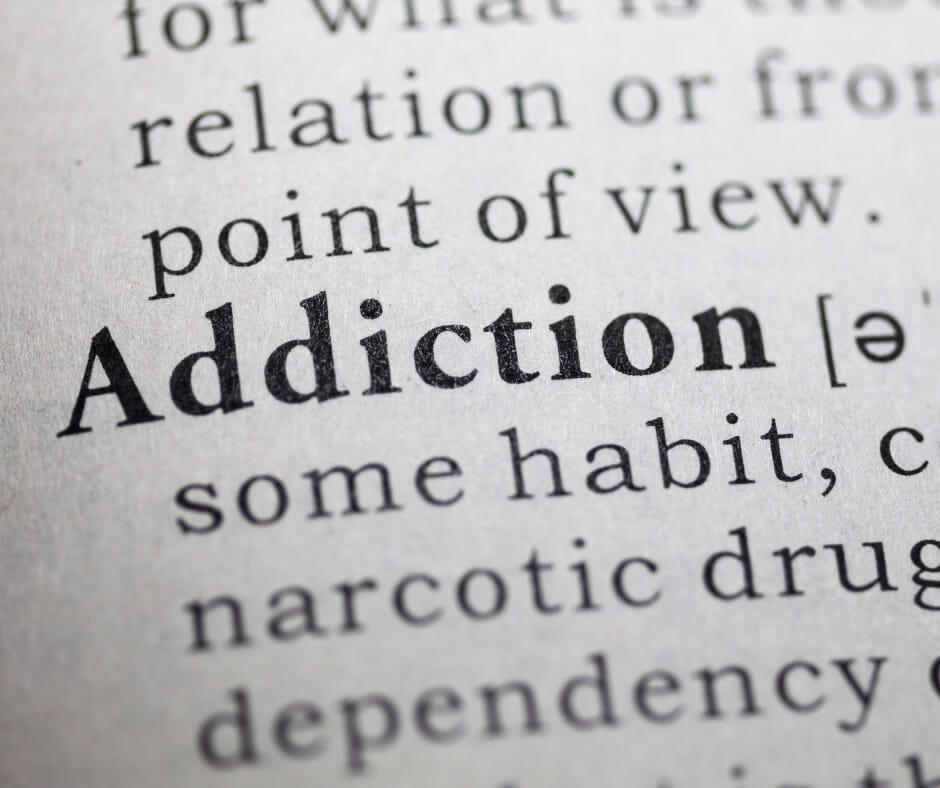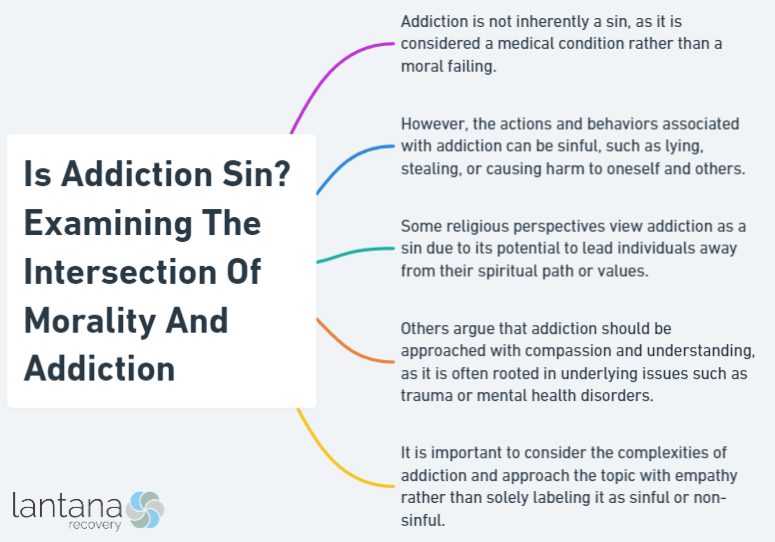
Addiction is a complex and multifaceted issue that has been widely debated in the realms of morality and ethics. Examining the intersection of morality and addiction can provide valuable insights into our understanding and approach towards this pressing societal concern.
To comprehend the connection between addiction and sin, it is crucial to first understand the concept of addiction itself. Addiction refers to a chronic condition in which an individual becomes physically and psychologically dependent on a substance or behavior, often leading to negative consequences in various aspects of their life. It is important to note that addiction is a recognized medical condition with biological, psychological, and social factors at play.
Sin, on the other hand, is a concept deeply rooted in religious and moral frameworks. It generally refers to acts or behaviors that are perceived as morally wrong or deemed as violations of divine law. Different religions have different interpretations and perspectives on sin, which influence the moral discourse surrounding addiction.
Exploring the historical perspective, addiction has been historically intertwined with notions of moral failing and sin. It was often viewed as a result of weak character or a lack of self-control. Such views fueled stigmatization and moral judgments towards individuals struggling with addiction.
However, the understanding of addiction and its treatment approaches has evolved over time. Many contemporary perspectives emphasize the disease model of addiction, which perceives addiction as a chronic illness rather than a moral failing. This approach acknowledges the complex interplay of biological, psychological, and social factors in addiction and emphasizes compassion, empathy, and evidence-based treatments.
Shifting narratives and changing perspectives are challenging the moral discourse surrounding addiction, focusing more on understanding and addressing the underlying factors contributing to addictive behaviors. This paradigm shift promotes progress towards compassion, empathy, and reframing addiction as a chronic illness that requires support, treatment, and rehabilitation.
Understanding Addiction
Understanding addiction is crucial when it comes to addressing this chronic brain disease. Addiction can greatly impact behavior and judgment, as it involves compulsive drug or substance use despite the potential for harmful consequences. It’s important to recognize that addiction is influenced by a combination of genetics, environment, and development, rather than being a result of moral failure or weak willpower.
To effectively treat addiction, a comprehensive approach is necessary, incorporating medical, psychological, and social interventions. With the right support, treatment, and ongoing care, successful recovery is possible. Providing non-judgmental and compassionate support is essential for individuals who are struggling with addiction. By delving into the underlying factors contributing to addiction, treatment plans can be tailored to meet specific needs.
Therapy, medication, support groups, and lifestyle changes often play a significant role in the recovery process. It’s important to acknowledge that relapse is common during addiction recovery, but it should be viewed as a setback rather than a failure, encouraging individuals to seek help once again.
By deepening our understanding of addiction, we can foster a more supportive and inclusive society that prioritizes prevention, treatment, and recovery.
What Is Addiction?
Addiction is a chronic brain disease characterized by compulsive drug use or engaging in harmful behaviors, despite negative consequences. It alters the brain’s structure and function. Those with addiction struggle to control cravings and impulses, leading to continued substance abuse or harmful behaviors. Relapse is common, highlighting the need for ongoing support and management.
Addiction affects physical health, relationships, work or school performance, and overall well-being. It can result in financial difficulties, legal issues, and a decline in quality of life. Treatment options include medications, behavioral therapies, support groups, and holistic approaches.
Seeking professional help is crucial to developing a personalized treatment plan. Understanding addiction allows us to approach it with empathy, support, and effective interventions. If you or someone you know is struggling with addiction, seek help from qualified professionals for recovery and a healthier life.”
Types of Addiction
When it comes to addiction, there are various types:
- Substance addiction: This includes dependence on drugs, alcohol, or tobacco. Substance addiction can have severe physical and psychological effects.
- Behavioral addiction: Unlike substance addiction, this involves compulsive behaviors that provide a sense of reward and pleasure. Examples include gambling, internet use, or compulsive shopping.
- Food addiction: Characterized by a loss of control over eating and an obsession with food, individuals with food addiction may compulsively overeat or binge on certain types of food.
- Gambling addiction: This manifests as an uncontrollable urge to gamble, leading to negative consequences in personal and financial aspects of life.
- Technology addiction: With increasing reliance on technology, individuals may become dependent on devices such as smartphones, social media platforms, or addiction to games like Pokemon Go neglecting other important aspects of life.
It’s important to note that addiction is a complex issue and can affect individuals differently. Seeking professional help and support is crucial for those struggling with any type of addiction.

The Concept of Sin
The concept of sin is integral to religious and moral frameworks. Sin encompasses immoral actions or thoughts that defy divine will and ethical principles. It is commonly associated with guilt, repentance, and the necessity for redemption.
When discussing addiction and sin, some argue that addiction is a sin due to its involvement in morally reprehensible behaviors such as substance abuse or compulsive actions. Conversely, others perceive addiction as a disease or a result of external factors.
Sin is subjective and varies across different religions and moral systems. It is closely connected to cultural values, beliefs, and traditions.
When examining addiction as a sin, it is crucial to consider the individual’s intentions and moral agency. Addiction can impair a person’s capacity to make ethical choices and control their actions. However, it is essential to approach the issue with empathy, recognizing that addiction is a complex problem that necessitates support and treatment.
Discussions about addiction and sin should account for diverse perspectives and moral frameworks. The concept of sin is deeply ingrained in religious and moral traditions, and its interpretation can diverge significantly.
What Is Sin?
Sin is a concept deeply rooted in religious and moral beliefs. It refers to morally wrong or offensive acts or behaviors. Different religions have their own interpretations and consequences for sin.
In Christianity, sin is viewed as disobedience to God’s commands and an offense against His divine nature. It separates individuals from God and has spiritual and eternal consequences. Sin is categorized into venial sins, which are less serious, and mortal sins, which are more grave and can result in eternal damnation.
Similarly, in Islam, sin is seen as a violation of Allah’s commands and a deviation from the righteous path. Muslims are encouraged to avoid sinful behaviors and seek forgiveness through repentance and good deeds. Islamic teachings emphasize personal responsibility for actions and the importance of striving for moral excellence.
In Hinduism, sin is the violation of dharma, which includes moral and ethical duties. It disrupts the cycle of karma and reincarnation, leading to negative consequences in future lives. Hindu scriptures highlight the importance of self-discipline, self-control, and virtuous conduct to avoid sin.
Sarah, a devout Christian, struggled with guilt and shame due to her past actions. She felt burdened by her sins and their perceived consequences. Through introspection and seeking spiritual guidance, Sarah found solace in forgiveness and redemption. She embraced the belief that acknowledging mistakes, seeking forgiveness, and striving for a righteous life were key to finding peace and spiritual growth. This realization allowed Sarah to move forward with hope and a commitment to living a life aligned with her religious values.
Remember, the concept of sin is deeply personal and subjective, and its understanding may vary among individuals and cultures.
How Is Sin Perceived in Different Religions?
Sin is perceived differently in different religions. Here is a look at how sin is perceived in various religions:
- Christianity: Christians view sin as the disobedience or violation of God’s laws. It separates individuals from God and is considered a moral wrongdoing that taints the soul. Christians also believe in original sin, which refers to the inherent sinful nature of humanity due to the fall of Adam and Eve.
- Islam: In Islam, sin is seen as a transgression against the commands of Allah. Muslims believe that every individual is born without sin and has the ability to choose between right and wrong. Sin can be forgiven through sincere repentance and seeking forgiveness from Allah.
- Hinduism: In Hinduism, sin is understood as the violation of dharma, which is the righteous duties and responsibilities that individuals have within society. Sin leads to negative karmic consequences that affect future lives until it is resolved through appropriate actions and spiritual growth.
- Buddhism: Buddhism considers sin as the result of ignorance and attachment, leading to suffering and the cycle of rebirth. The focus is on self-awareness and personal responsibility to overcome desires and achieve enlightenment, ultimately breaking free from the cycle of suffering.
- Judaism: In Judaism, sin is seen as a violation of the commandments and laws given by God. Repentance, seeking forgiveness, and making amends are crucial to the process of atonement and returning to a state of righteousness.
Each religion provides guidance on recognizing, avoiding, and seeking forgiveness for sin. Understanding these different perspectives can promote interfaith dialogue and a deeper appreciation for diverse beliefs and cultural practices.
Fact: Addiction is considered a brain disorder. Addiction affects the brain’s reward system and can lead to changes in behavior, judgment, and decision-making, according to experts at Yale School of Medicine.

Examining the Link between Addiction and Sin
Exploring the connection between addiction and sin opens up a fascinating realm of inquiry. In the upcoming sections, we’ll delve into the historical perspective on addiction and sin, as well as the views surrounding addiction as a moral failing. Additionally, we’ll uncover the detrimental impact of stigma on addiction. Brace yourself for a thought-provoking exploration of the complexities that emerge when morality intertwines with the realm of addiction.
The Historical Perspective on Addiction and Sin
The historical perspective on addiction and sin provides valuable insights into how these concepts have been understood and perceived over time. Throughout history, addiction has been regarded as a moral issue, with individuals struggling with substance dependence being judged as morally weak. This belief can be traced back to ancient civilizations, where addiction was connected to a lack of self-control and discipline.
In various religious traditions, such as Christianity and Islam, addictive behaviors have been regarded as sinful acts that indicate moral deficiencies. It was believed that individuals who engaged in addictive behaviors actively chose to sin and, therefore, bore moral responsibility for their addiction.
During the 19th and early 20th centuries, the moral view of addiction received reinforcement from the temperance movement and the prohibition era. Society started perceiving addiction as a moral failing instead of a medical or psychological issue. People grappling with addiction faced stigmatization, condemnation, and judgment.
However, over time, there has been a shift in understanding addiction from a moral failing to a complex medical condition. This shift can be attributed to scientific research on addiction and the recognition of its neurological and psychological underpinnings. Today, addiction is increasingly seen as a chronic illness that necessitates compassionate treatment and support rather than moral judgment.
Understanding the historical perspective on addiction and sin enables us to grasp how societal perceptions and attitudes towards addiction have evolved. By acknowledging the influence of historical beliefs, we can strive towards a more compassionate and evidence-based approach to addiction treatment and support.
Views on Addiction as a Moral Failing
Addiction as a moral failing is a long-standing perspective in many societies. It blames individuals for their actions and holds them accountable. This view sees addiction as a result of personal weaknesses and a lack of moral character.
Critics argue that this perspective ignores important factors like genetics, environment, and mental health issues that contribute to addiction. They argue that addiction should be seen as a disease rather than a moral failing.
Recently, there has been a shift towards viewing addiction as a public health issue instead of a moral problem. This new perspective acknowledges the biological and psychological aspects of addiction and emphasizes the importance of compassion and support for those struggling with substance use disorders.
It is important to note that views on addiction as a moral failing can vary among individuals and cultures. Some people still believe that addiction is solely a result of personal choices and moral shortcomings. However, a growing body of evidence supports the idea that addiction is a complex condition that requires a comprehensive approach involving medical, psychological, and social support.
Understanding different viewpoints on addiction as a moral failing is crucial for fostering empathy and developing effective strategies for prevention, treatment, and recovery. By recognizing addiction as a disease, we can focus our efforts on providing individuals with the support and resources they need to overcome this challenge.
The Impact of Stigma on Addiction
Stigma affects individuals struggling with addiction. It leads to judgement, discrimination, and barriers to seeking help. Stigma also causes self-perception issues, reduces support systems, and hinders well-being.
“As a number of studies have shown, language perpetuates the stigma surrounding substance use. This can create barriers in in vital areas, such as health care, employment, insurance policies, and laws for individuals who are trying to heal and make meaningful contributions to society.” (Stigma: how it affects the substance use disorder patient, Zwick et al., 2020)
Recognizing its impact is crucial for creating an understanding and supportive environment. Challenging stigmatizing beliefs and educating society fosters acceptance and encourages individuals with addiction to seek help without fear of judgement or discrimination.

Treatment Approaches and Ethics
When it comes to treating addiction, it is vital to incorporate various treatment approaches and ethical considerations. This ensures that individuals struggling with addiction receive the best possible care.
- One effective treatment approach is behavioral therapy, which includes cognitive-behavioral therapy (CBT) and contingency management. These therapies modify unhealthy behaviors and thought patterns, promoting long-term recovery.
- Another important approach is pharmacotherapy, which involves the use of medications such as methadone, buprenorphine, and naltrexone. These medications help alleviate withdrawal symptoms, reduce cravings, and promote abstinence for individuals with opioid and alcohol addiction.
- Mutual support groups, like Alcoholics Anonymous (AA) and Narcotics Anonymous (NA), also play a crucial role in addiction treatment. These groups provide a supportive and non-judgmental environment where individuals can share their experiences and receive encouragement from their peers.
- Furthermore, personalized treatment plans are essential. These plans take into account the unique needs and circumstances of each person struggling with addiction, including co-occurring mental health disorders, social support, and personal goals.
In addition to treatment approaches, ethics also play a significant role in addiction treatment. It is vital to prioritize the autonomy and dignity of individuals seeking treatment. This includes obtaining informed consent and respecting their choices. Healthcare professionals and treatment providers must adhere to ethical guidelines, ensuring confidentiality, avoiding conflicts of interest, and providing evidence-based care.
How Does Morality Influence Treatment Approaches?
Morality plays a significant role in influencing treatment approaches for addiction. It not only influences how addiction is perceived but also impacts the decisions made regarding punitive actions or compassionate treatment. Morality also guides the distribution of resources and determines how individuals seeking treatment are prioritized. Treatment approaches that align with moral values may be preferred, but it is essential that they are evidence-based and customized according to the specific needs of each individual.
Should Addiction Be Treated as a Moral Issue?
Addiction should not be treated as a moral issue. It is a complex medical condition that involves both physical and psychological factors.
Rather than viewing it as a choice or a moral failing, we should recognize addiction as a chronic illness that requires compassion, understanding, and evidence-based treatment approaches.
Approaching addiction from a public health perspective is essential to prevent stigma and discrimination.
By focusing on prevention, harm reduction, and evidence-based treatments like medication-assisted therapy, counseling, and support groups, we can help individuals overcome addiction and improve their overall well-being.
It is important to cultivate a society that promotes compassion, education, and access to effective treatment options for those impacted by addiction.
Working together, we can make a positive difference in the lives of individuals and communities affected by this chronic illness.
If you are looking for outpatient rehabilitation centers in Charleston South Carolina, be sure to pay a visit to Lantana Recovery to discuss your possible treatment options without any judgement or stigma.
Beyond Morality: The Disease Model of Addiction
Break free from the limitations of moral judgment and explore the fascinating world of addiction through the lens of the disease model. Discover the intricacies of this alternative perspective as we dive into understanding the disease model, weighing its advantages and disadvantages, and redefining addiction as a chronic illness. Let’s challenge conventional notions and broaden our understanding of addiction beyond the confines of right and wrong.
Understanding the Disease Model
The disease model perspective helps us comprehend addiction as a chronic illness brought about by a combination of genetic, environmental, and neurological factors. It focuses on medical treatment rather than punishment, eliminating any moral judgment.
By understanding this model, we realize that addiction requires long-term management, similar to conditions like diabetes or hypertension. It emphasizes the importance of comprehensive treatment to address the physical, psychological, and social aspects of addiction.
Nevertheless, critics argue that it may remove personal responsibility and undermine individual agency in the recovery process. While addiction does have biological components, personal choices and behavior also play a significant role.
Recovery is a lifelong journey, but with the right support, treatment, and behavioral changes, individuals can effectively manage their addiction and lead fulfilling lives. Adopting the disease model helps to destigmatize addiction and encourages compassion for those battling this illness.
Advantages and Disadvantages of the Disease Model
Using the disease model of addiction to understand and treat addiction has both advantages and disadvantages.
Advantages:
- The disease model reduces stigma by framing addiction as a medical condition rather than a moral failing.
- It emphasizes the importance of professional treatment and medical intervention.
- The model recognizes addiction as a chronic, relapsing condition, highlighting the need for ongoing management and support.
- It promotes empathy and compassion towards individuals struggling with addiction.
Disadvantages:
- Critics argue that the disease model oversimplifies addiction by overlooking psychological, social, and environmental factors.
- Labeling addiction as a disease may undermine personal responsibility and the agency of individuals in recovery.
- Over-reliance on pharmaceutical interventions may occur if addiction is overly medicalized, neglecting psychological and behavioral approaches.
- The disease model may limit personal growth and self-empowerment in recovery.
Reframing Addiction as a Chronic Illness
Addiction is increasingly being recognized as a chronic illness, shifting away from the idea that it is a moral failing. This change in perspective has important implications for how we approach and treat individuals struggling with addiction.
One advantage of reframing addiction as a chronic illness is that it acknowledges the complex nature of the condition. It recognizes that addiction is not solely a result of personal choices or moral weaknesses, but involves changes in the brain that impact behavior and decision-making. Researcher Nick Heather, professor of Alcohol & Other Drug Studies at Northumbria University claimed addiction is a neurobiological and behavioral disorder in his research published in the Journal of Neuroethics . This new perspective helps to reduce the stigma associated with addiction and encourages a more compassionate and understanding approach.
Understanding addiction as a chronic illness allows us to implement evidence-based treatment approaches that effectively manage the condition. Treatment can focus on long-term management, preventing relapse, and addressing underlying factors contributing to addiction.
Reframing addiction as a chronic illness also emphasizes the importance of ongoing support and care. Just like other chronic illnesses such as diabetes or hypertension, addiction requires continuous monitoring and management for recovery and relapse prevention. This perspective highlights the need for a comprehensive and holistic approach that includes medical, psychological, and social support.
Suggestions:
- Foster understanding of addiction as a chronic illness among healthcare professionals, policymakers, and the general public.
- Implement comprehensive treatment programs addressing the physical, psychological, and social aspects of addiction.
- Invest in research to enhance understanding of addiction as a chronic illness and develop innovative treatment approaches.
- Integrate addiction treatment into mainstream healthcare systems to ensure accessibility and continuity of care.
- Advocate for policies that reduce addiction stigma and promote a supportive and non-judgmental environment for individuals in recovery.
- Self-reflectance and writing about your addiction to share your personal experience and raise awareness will also significantly help reduce the moral stigma surrounding addiction.

Frequently Asked Questions
Is addiction considered a sin in Christian doctrine?
According to the Christian doctrine of sin, addiction can be seen as a sinful behavior. Any act, thought, desire, emotion, word, or deed that displeases God and deserves blame is considered a sin. However, it is important to note that addiction is a complex issue, and addicts are often victims of a combination of factors. Therefore, the question of whether addicts should be condemned for their sinful habits or seen as morally blameless due to factors beyond their control remains a topic of debate.
How does the brain disease model of addiction impact the attribution of free will to individuals with addiction?
The brain disease model of addiction argues that addiction is a chronic brain disease caused by dysfunction in reward and pleasure-seeking brain systems. This perspective has been criticized for potentially diminishing the attribution of free will and responsibility to individuals with addiction. A research study found that neuroscience information, which supports the brain disease model, can reduce attributions of free will in addiction. However, it is crucial to consider individual beliefs and characteristics, as some factors like education and self-reported knowledge of neuroscience were associated with lower attributions of responsibility.
Does addiction lead to moralization and stigma?
Yes, addiction often leads to moralization and stigma. The disease model of addiction, which characterizes addiction as a brain disease, has been widely accepted. However, there are alternative non-disease models of addiction that argue addiction is a matter of choice and willpower. Both the disease and non-disease models can contribute to moralization, blaming, and stigmatizing addicts. Moralization can shift the focus from social and economic causes to individual responsibility, resulting in unjust policies and resource distribution.
How does moralization affect addiction recovery?
Moralization can have both positive and negative effects on addiction recovery. On one hand, it can lead to a focus on individual responsibility and blame, which may hinder recovery and damage self-esteem. On the other hand, moralization can also be a way to address the social and economic causes of addiction and promote healthier behaviors. It is important to find a non-stigmatizing approach to addiction recovery that considers both the disease model and alternative models of addiction.
How does neuroscience information influence beliefs about free will in addiction?
Research suggests that neuroscience information can influence beliefs about free will in addiction. One study found that knowledge of neuroscience generally decreased attributions of responsibility in addiction. However, the impact of neuroscience information on belief in free will remains contested. Factors such as education and self-reported knowledge of neuroscience were associated with lower attributions of responsibility.
What are the challenges in integrating addiction research with Christian perspectives on sin?
The integration of addiction research with Christian perspectives on sin faces challenges due to different metaphysical and theological assumptions. The scientific understanding of addiction often relies on neurobiological explanations and medical language, while Christian perspectives emphasize moral responsibility and the concept of sin. Bridging these perspectives requires dialogue and understanding the underlying models of addiction. However, it is possible to assign moral responsibility proportional to the voluntary dimension of an addict’s actions, without ruling out the possibility of divine help and redemption.









